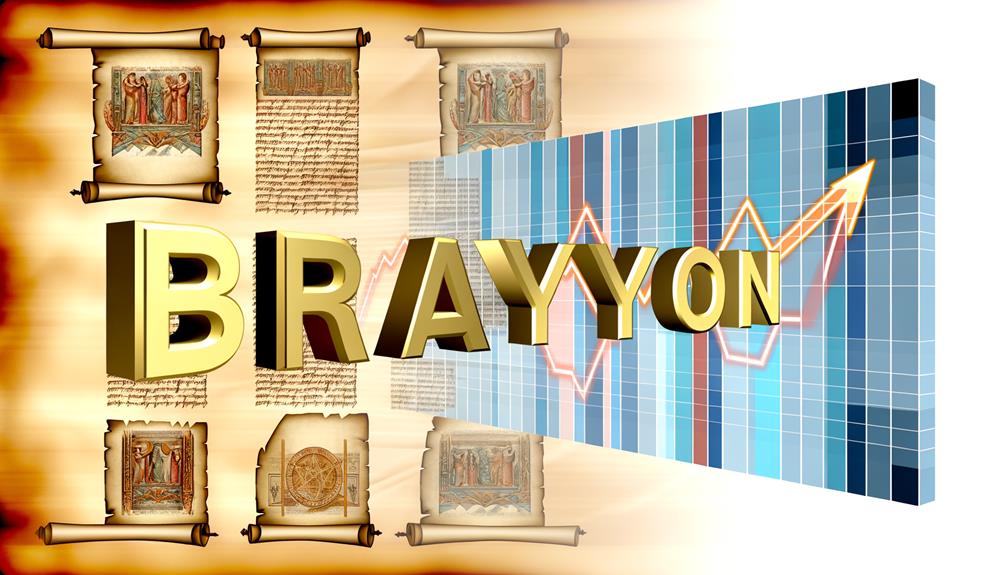Braylon Meaning In The Bible: Origin and Interpretation
The name Braylon does not appear in the Bible, nor does it have direct biblical origins. It likely emerges from a blend of ‘Bray’ and ‘Landon,’ with ‘Bray’ possibly relating to the Irish word for ‘marsh’ or ‘broad.’ Some suggest its components may be linked to Hebrew names, such as ‘Bar’ (son) and ‘Elon’ (oak or strong).
Although not explicitly biblical, the name aligns with modern naming conventions that borrow from diverse cultural elements. To further grasp its nuances and symbolic potential, especially within a biblical or religious framework, consideration of its etymological roots is beneficial.

Braylon Meaning in the Bible: Spiritual Interpretation and Significance
| Aspect | Explanation |
|---|---|
| Name Origin | Modern American name; not directly found in the Bible |
| Possible Roots | Blend of “Brayden” and “Jaylon”; Brayden means “broad hill” |
| Biblical Connection | No direct mention; interpreted through symbolic themes |
| Spiritual Interpretation | Represents strength, leadership, and a noble calling |
| Usage Today | Popular modern name with positive and aspirational qualities |
Etymology of Braylon

The etymology of the name ‘Braylon’ reveals a relatively modern origin, likely emerging from the blending of traditional names such as ‘Bray’ and ‘Landon.’ This amalgamation suggests a creative synthesis, indicative of contemporary trends in name formation.
‘Bray,’ potentially deriving from the Irish surname meaning ‘marsh’ or ‘broad,’ intersects with ‘Landon,’ an Old English name denoting ‘long hill.’ The fusion of these elements signifies a cultural shift towards unique and personalized naming conventions, diverging from strictly historical or biblical roots.
The neo-classical structure of Braylon aligns with a broader societal pattern, reflecting evolving linguistic preferences and a nuanced appreciation for novel yet familiar phonetic combinations.
Consequently, Braylon epitomizes modern nomenclature innovation.
Modern Usage of Braylon

In contemporary society, the name Braylon has experienced a surge in popularity among parents, reflecting broader cultural trends and societal values.
Its modern significance is multifaceted, encompassing elements of uniqueness and identity, while also giving rise to various nicknames and stylistic variations.
Understanding these dynamics offers valuable insights into the evolving landscape of naming conventions.
Popularity Among Parents
Gaining traction in recent years, the name Braylon has seen a notable rise in popularity among modern parents, reflecting broader societal trends in unique and non-traditional naming conventions.
This surge can be partially attributed to a cultural shift towards individuality and the desire for distinctiveness in children’s names. Statistical data from various baby name registries indicate a steady climb in the usage of Braylon, positioning it as a favored choice among contemporary parents.
This trend aligns with an increased openness to names that blend different cultural and phonetic elements.
Additionally, the media and celebrity influence, along with social media platforms, have played a substantial role in popularizing Braylon, further embedding it within the lexicon of modern baby names.
Cultural Significance Today
Modern cultural landscapes continue to shape the usage of Braylon, reflecting its resonance with contemporary values of uniqueness and cultural blending.
Today, parents increasingly seek names that stand out while still feeling relatable, and Braylon fits this criterion. The name combines traditional elements with a modern twist, appealing to those desiring originality without straying too far from conventional phonetics.
Additionally, the name’s phonetic fluidity allows it to transcend cultural and ethnic boundaries, making it a versatile choice in diverse communities.
Its emergence in popular culture, particularly through sports figures and entertainers, further cements its relevance, illustrating how modern contexts imbue Braylon with a dynamic, multifaceted significance that aligns with evolving societal trends.
Variations and Nicknames
The name Braylon, with its phonetic adaptability, has generated a variety of modern variations and nicknames that reflect its linguistic versatility and cultural integration.
Common variations include Braylen, Braylin, and Braelon, each subtly altering the original while maintaining its core identity.
Nicknames such as Bray, Lon, or even B-Ray illustrate the name’s flexibility and endearment potential in contemporary settings.
These modifications and abbreviations underscore Braylon’s seamless fit into diverse linguistic and cultural landscapes.
The evolution of Braylon’s usage epitomizes the dynamic nature of names, adapting to societal trends while preserving individual uniqueness.
Such variations not only enhance the name’s appeal but also mirror broader patterns of name adaptation and personalization in modern contexts.
Braylon in Biblical Context

Although the name Braylon itself does not appear in the Bible, understanding its potential roots and etymological significance can provide a context for its relevance to biblical traditions and naming conventions.
The name Braylon is believed to be a modern American creation, possibly derived from the combination of Brayden and Jaylon.
Analyzing this within a biblical framework, it is essential to examine the significance of names in ancient Hebrew culture, where names often conveyed profound meanings or divine attributes.
While Braylon may not directly align with traditional biblical names, its modern usage reflects a continuing tradition of imbuing names with personal or aspirational significance, resonating with the biblical practice of thoughtful and purposeful naming.
Hebrew Name Analysis
In order to analyze the name Braylon within a Hebrew context, it is essential to explore the linguistic and cultural principles that governed ancient Hebrew naming conventions.
Hebrew names often carried significant meanings, reflecting attributes, divine aspects, or life circumstances. Names were more than identifiers; they conveyed theological and societal values.
While ‘Braylon’ itself does not have a direct Hebrew origin, examining its components is beneficial. The prefix ‘Bray’ may relate to ‘Bar,’ a Hebrew term for ‘son,’ while ‘lon’ could be loosely connected to ‘Elon,’ meaning ‘oak’ or ‘strong.’
Though speculative, such an analysis underscores the importance of dissecting name elements within their original linguistic frameworks to understand potential Hebrew influences and meanings.
Greek Name Influence

Examining Greek naming traditions reveals significant layers of cultural and linguistic influence that have permeated biblical name interpretations.
The integration of Hellenistic elements into Judeo-Christian contexts during the intertestamental period underscores the syncretic nature of biblical onomastics.
This interplay not only reflects the dynamic evolution of names like Braylon but also provides a deeper understanding of their etymological and theological dimensions within the Bible.
Greek Naming Traditions
Greek naming traditions have profoundly influenced the development and adoption of names within various cultures, including those found in biblical texts.
The Hellenistic period, marked by the spread of Greek culture following Alexander the Great’s conquests, facilitated the permeation of Greek names and terminology into diverse regions. This cross-cultural integration resulted in names like Lydia, Philip, and Andrew appearing within biblical narratives.
The Greek practice of attributing names based on virtues, divine attributes, or notable characteristics contributed to this integration. For instance, names such as Dorcas (meaning ‘gazelle’) highlight the descriptive nature inherent in Greek nomenclature.
Such influences underscore the syncretic evolution of names, bridging cultural and linguistic divides, thereby enriching the tapestry of biblical onomastics through Greek traditions.
Biblical Name Interpretations
Analyzing the influence of Greek culture on biblical name interpretations reveals a complex interplay between linguistic traditions and theological concepts.
Greek, as the lingua franca of the Hellenistic world, profoundly impacted the Septuagint and the New Covenant. This influence extended to the translation and interpretation of Hebrew names, infusing them with Hellenistic nuance.
For instance, the Hebrew name ‘Yeshua’ became ‘Iēsous’ in Greek, leading to the English ‘Jesus.’ This transliteration process often altered phonetic and semantic characteristics, reflecting both cultural integration and theological adaptation.
Understanding these nuances is essential for comprehending how biblical names evolved and were understood within their historical contexts, demonstrating the dynamic nature of scriptural language and its interpretative traditions.
Historical Origins

The historical origins of the name Braylon are not explicitly documented in biblical texts, necessitating an exploration into broader cultural and etymological contexts.
The name Braylon is relatively modern and likely derives from a blend of traditional names such as Brayden and Jaylon. Unlike names rooted in ancient languages like Hebrew or Aramaic, Braylon’s lineage appears to be a product of contemporary naming trends, particularly within English-speaking regions.
Its composition may reflect a synthesis of Gaelic and African American naming customs, each contributing distinct phonetic and cultural elements. This amalgamation underscores the dynamic evolution of names, often influenced by societal shifts and intercultural exchanges, rather than by direct scriptural references or ancient religious traditions.
Symbolic Meanings

Although the name Braylon is not directly derived from biblical texts, its symbolic meanings can be interpreted through the cultural and phonetic elements that constitute its modern form. The name’s components offer rich opportunities for symbolic analysis:
- Bray: The word ‘bray’ can evoke imagery of strength and vocal expression, akin to a trumpet’s call in biblical narratives.
- Lon: Similar phonetically to ‘lone’ or ‘alone,’ it may symbolize spiritual solitude or introspection.
- Combined Meaning: Together, they suggest a balance between assertive expression and introspective reflection.
These elements collectively contribute to understanding Braylon’s symbolic resonance within a broader spiritual and cultural context.
Braylon and Christian Values

In examining the name Braylon through the lens of Christian values, one can discern attributes that align with virtues such as courage, introspection, and spiritual expression.
The name’s etymology reveals an inherent strength, often associated with the valor encouraged in biblical narratives. This courage resonates with the Christian call to face adversities with faith.
Additionally, the reflective nature of the name Braylon signifies a propensity for introspection, mirroring the Christian practice of self-examination and repentance.
Ultimately, the name’s unique phonetic structure and modern appeal lend themselves to an expression of individuality, aligning with the Christian belief in the unique divine purpose inherent in each individual.
Consequently, Braylon embodies a fusion of bravery, self-reflection, and spiritual purpose.
Similar Biblical Names

When examining names akin to Braylon within a biblical context, it becomes pertinent to explore those that share similar etymological roots or thematic elements.
Biblical names such as Absalom and Solomon, which carry connotations of peace and leadership, present themselves as significant comparisons.
Additionally, common biblical alternatives like David and Jonathan also offer rich historical and spiritual significance, aligning closely with the values often associated with Braylon.
Names With Similar Origins
Several names in the Bible share origins and meanings similar to Braylon, reflecting common themes of strength, faith, and divine favor. These names often embody the virtues and attributes valued in biblical narratives, providing a rich tapestry of linguistic and cultural significance.
The following examples highlight some of these names:
- Ethan: Meaning ‘strong,’ Ethan is a name frequently associated with wisdom and resilience.
- Gabriel: This name, meaning ‘God is my strength,’ signifies divine support and protection.
- Elijah: Meaning ‘My God is Yahweh,’ Elijah represents steadfast faith and prophetic power.
Such names illustrate the deep interconnection between nomenclature and theological concepts in biblical contexts.
Common Biblical Alternatives
Given the rich tapestry of names with shared origins and meanings, it is insightful to explore common biblical alternatives that resonate with the same themes as Braylon. Examining these names provides a broader understanding of their cultural and spiritual significance within biblical contexts. Here are some common biblical alternatives:
| Name | Meaning | Biblical Reference |
|---|---|---|
| Benjamin | Son of the right hand | Genesis 35:18 |
| Nathan | He gave | 2 Samuel 7:2 |
| Samuel | Heard by God | 1 Samuel 1:20 |
| Joshua | God is salvation | Joshua 1:1 |
These names not only align with the thematic elements of Braylon but also offer profound scriptural heritage, enhancing their resonance with those seeking meaningful biblical connections.
Popularity Trends

Analyzing the popularity trends of the name Braylon reveals significant fluctuations over recent decades, influenced by cultural, social, and religious factors. The name, relatively modern in its emergence, often experiences changes in its usage patterns due to various external stimuli.
A scholarly examination uncovers the following key influences:
- Cultural Shifts: Popular media and celebrity influences often sway naming trends.
- Social Dynamics: Peer group preferences and societal norms play a role.
- Religious Factors: Names with biblical associations may witness varying appeal based on religious movements.
These elements collectively contribute to the name Braylon’s dynamic presence within contemporary naming conventions, reflecting broader societal trends and shifts.
Choosing Braylon for Your Child

Understanding the factors that influence the popularity of the name Braylon, prospective parents can make an informed decision when considering it for their child.
Braylon, a modern name with Celtic origins, often resonates with parents due to its unique phonetic structure and contemporary appeal.
While it does not have direct biblical references, its potential meanings—like ‘brave’ or ‘noble’—can align with values held in high esteem within many religious contexts.
Additionally, analyzing current naming trends reveals that Braylon’s rising popularity may be attributed to its blend of traditional and modern elements.
Parents should consider these facets, alongside cultural and familial significance, to guarantee the name harmonizes with their aspirations and values for their child’s identity.
Conclusion
In the grand tapestry of names, Braylon emerges as a modern appellation with threads tracing back to biblical contexts.
Though not directly found in scripture, its etymological roots and cultural resonances intertwine with significant Hebrew and Greek influences.
This name, evoking Christian values and historical parallels, has seen fluctuating popularity, reflecting contemporary naming trends.
Choosing Braylon for a child consequently becomes an act of weaving historical depth with modern significance, offering a name rich in layered meaning.






